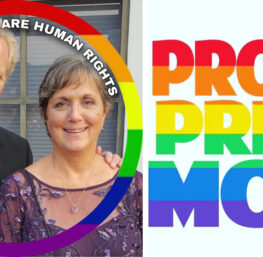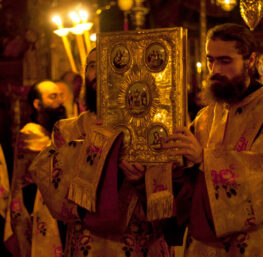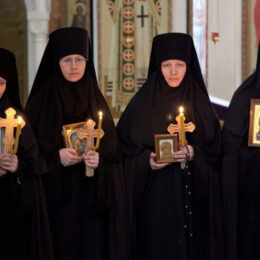GARY STERN – The Journal News
(Original publication: June 23, 2004)
http://www.thejournalnews.com/newsroom/062304/b04w23marriage.html
The age-old notion of Christian marriage between man and woman is under siege by loosening sexual mores, commonplace divorce and the reality that homosexual relationships will soon be commonly recognized, several Orthodox Christian scholars agreed yesterday.
Speaking at St. Vladimir’s Orthodox Theological Seminary, these scholars wrestled with how to reconcile traditional church teachings with a culture that they say is often well-meaning, but losing touch with basic Christian beliefs.
Controversial question of same-sex relationships, for instance, the speakers agreed that Orthodox tradition requires gays and lesbians to live chaste, sexless lives. But they hardly seemed satisfied with such a conclusion, in light of the growing consensus that homosexual orientation is not a choice for at least a large minority of gays and lesbians.
Peter Bouteneff, an assistant professor in dogmatic theology at St. Vladimir’s, considered the options facing a gay Christian, such as denial, lying, leaving the church or chastity. “I’m not sure I could bear that cross,” he said.
About 60 Orthodox priests and lay leaders from across the country participated in yesterday’s talks as part of a weeklong institute on “Does Christian Marriage Have a Future?” Speakers are looking at the meaning and importance of Christian marriage, as well as the myriad challenges to it: divorce, cohabitation, interfaith marriage and the hot-button cultural question of the day, same-sex unions.
Bouteneff concluded that gay sex is “misdirected” sexual expression and sinful. But he said the church has to address sensitive questions, such as whether there is anything redeemable in a committed, same-sex relationship.
“If we answer in the negative, we better come up with a good reason, a credible reason,” he said. “I don’t think we have yet.”
Albert Rossi, a clinical psychologist and lecturer in pastoral theology at the seminary, said he was firmly convinced that most homosexuals cannot change their orientation. He practically pleaded with pastors not to try to “cure” gay and lesbian parishioners, saying such a process would only cause pain.
He also insisted that just because homosexuality is often in-born does not make it normal.
“You don’t define normal statistically,” he said. “Just because many people divorce, doesn’t make it normal. I don’t see homosexuality as normal.”
Rossi and others stressed that Orthodox priests must pastor gays and lesbians with as much love and understanding as possible, while never condoning any sex outside of Christian marriage.
“Can the Orthodox Church, then, ever bless gay marriage or same-sex unions?” asked the Rev. John Breck, a prominent Orthodox theologian, in his keynote address on Monday. “The answer must surely be no. Once again, this is not, or should not be, a puritanical or homophobic reaction against what many people consider to be aberrant and repulsive behavior. Rather, it is because there is a better way in terms of both spiritual and physical well-being.”
The Orthodox view on such issues often gets lost in the Christian mix because there are only about 2 million Orthodox Christians in North America. The Roman Catholic Church and evangelical churches normally speak for the traditional view, while some mainline Protestants lead the call for recognition of gay rights.
Orthodox Christianity dates back to the earliest Christian communities. Its followers did not break with the Rome-based church until 1054.
Seminary Dean John Erickson said that Orthodoxy can lend a balanced voice to cultural debates, one steeped in Christian tradition but open to difficult questions and discussion. Orthodox leaders are often slow to speak out, he said, because of Orthodoxy’s small numbers and a lack of coordination among the independent Orthodox churches that make up the community.
“The Orthodox have often felt excluded from the public square or have felt afraid to enter the public square,” Erickson said. “To retreat and pretend we live in a hyphenated American ghetto — Greek-Americans and Russian-Americans and so on — runs contrary to Orthodox tradition, in which the church has been very involved in the lives of people.”
St. Vladimir’s has been training Orthodox priests since 1938. The seminary’s faculty and students have come from many of the 19 Orthodox churches, most of which are based in Eastern Europe.
The Rev. Alexander Rentel, an instructor in church history and canon law at St. Vladimir’s, spoke yesterday about overlooked threats to Christian marriage, such as the divorce rate, unmarried couples living together, and marriages between Orthodox Christians and non-Christians.
Rentel said that church laws or canons clearly prohibit cohabitation and interfaith marriage and strongly discourage divorce. But all have become commonplace, putting pastors in very awkward positions. “What, then, is the church if its beliefs can simply be changed to accommodate the world?” Rentel asked.
Several priests described the difficult situations they regularly face, counseling parishioners, including their own relatives, who cohabitate or marry outside the faith.
Part of the answer, Rentel said, is to do a better job of educating parishioners about Christian marriage, which aims to bring a man and woman into a relationship with Christ. “We must bring people to the Gospel first,” he said.




If God calls it an abomination, who are we to call it kosher. Orthodoxy will cost you your life; it is no longer a luxury.
I have been hard on seminary professionals here before. It is my belief that in a culture which is losing/forgetting/rejecting it’s Christian elements, the Church, and it’s apologists (the place the seminary has put itself in when it has conferences like the above) has a duty to speak clearly and with courage. The seminary professional himself has a duty to be clear and courageous in his faith so he can serve out his function as both teacher and witness (this is plain enough). So with that in mind, listen to the following quote from Peter Bouteneff, assistant professor in dogmatic theology:
Bouteneff concluded that gay sex is “misdirected” sexual expression and sinful. But he said the church has to address sensitive questions, such as whether there is anything redeemable in a committed, same-sex relationship.
“If we answer in the negative, we better come up with a good reason, a credible reason,” he said. “I don’t think we have yet.”
Now, assuming that the article got the context right (a big if I realize) I find this seriously disheartening. First of all, it simply is not true. A “credible” reason has allot to do with your worldview. If Mr. Bouteneff means that “we”, meaning the Church, have not “come up with”, meaning discerned in the Holy Spirit, the reasons for rejecting “committed same sex relationships” then he is clearly mistaken. If he means reasons that are “credible” to the neo-pagans who support such abominations, then I would question the possibility of such a thing. There is much that is “redeemable” in any friendship, etc. and I am sure there are many unrepentant homosexual relationships that have many good things in them, but that is in spite of, not because of, the “committed same-sex relationship”. This seems to me to be an obvious distinction, and I am not sure why a seminary professional would not make it. This leads me to question fundamentally his work and role there, and that of the seminary as a whole. Has St. Vlad’s become a place of speculative, left-leaning cultural “orthodoxy”? If so, is that what we really need? I think “the times” call for something quite different…
Truly, we will minister to our brothers and sisters who are facing such an awfull temptation. After all, all of us face temptations large or small through our lives. Our job is to ask for our Saviour’s help and carry on living righteous lives. However this poses huge practical questions and including “chaste” homosexually-oriented people in our community holds us the heterosexual youth in great accountability as far as our own dating habits go.
How do we think we are permitted to date, without getting physical close, especially when not ready to get married? Would homosexual people be allowed to date without a physical relationship? This issue leads us to reflect on our own dating practices with much more responsibility.
It makes it very clear than dating for fun, without serious and well thought prospects and intentions of an Orthodox marriage is unacceptable. Of course sometimes it is tolerated in our church, ’cause how can you tell an 18 year old, that hangs out with other “christian” friends that their one true Faith requires them to hold much greater standards of purity and responsibility?
I hate to admit it, but our Orthodox greek (and I believe the same holds for Slavic) tradition, is probably wise in discouraging dating relationships and involving the parents and community so much. As much as it may be annoying, impractical, and backwards-looking to us, it seems like this practice holds a lot of wisdom. After all the purity of the body is not enough, it needs to be accompanied by a pure heart as well. And we are also reminded we need to always contemplate living our whole life Jesus as our Bridegroom until He shows us which way to go.
I know this is quite hard and sounds idealistic, but lets at least recognize that the dating practice is not an Orthodox tradition but we’ve rather adopted it in varying degrees from our Protestant (western-cultured) friends.
Just some thought that are not that pleasing to my selfish little self either, but seems quite true. What do you think?
Yes, absolutely. The whole dating scene for teens should be shelved. I’ve argued this for years. Let teens congregate in groups and get away from pairing. There should be no pressure for intimacy, no practice for marriage, until later. You will find that you are swimming upstream with this view however, especially with parents.
Christopher,
Dr. Bouteneff’s comment struck me the same way it did you. Essentially he argues that ideas against same-sex marriage require the acceptance of those he implicitly reproves. He doesn’t seem to realize that in doing so, he cedes his authority to them.
What he does not see I think, is that his reproof doesn’t depend on his personal authority alone. The words have a power unto themselves because ultimately they come from God. This is a bold assertion, but given that the words have their final source in the words of scripture, it cannot be any other way.
So yes, I agree that there is an implicit conflict of “world views” revealed in that statement. I would argue that it is better to say nothing at all, rather than obsfucate the truth in the manner exhibited here. (Relativism hiding behind a display of virtue?)
Why did it occur? I don’t think its because St. Vladimir’s is a “left-leaning seminary” (I graduated from St. Vlad’s). I think it goes back to something Solzhenitsyn said years ago: What the West faces is a crisis of courage. Dr. Bouteneff’s statement, I believe, exhibits the ambivalence of the academic moralist, ie: knowledge of the texts of scripture and tradition that deal with moral fundamentals, but irresolution toward the cost that such knowledge imposes.
The fact is that much good thinking has emerged about same-sex marriage. I’ve put some of the pieces on my site. Notice though, that precious little has come from the seminaries of any denominational stripe. The best have come from religiously devout people, Christian and Jew alike, but almost none are “seminary professionals,” as you put it.
Dr. Bouteneff’s comments are disheartening b/c they “leave the door open” as it were, implying there is a grey area where, in reality, there is none.
He preaches the whole “it’s a bigger cross than anything”. Well. No. It’s human sin. All human sin is a bigger cross than anything and only by God’s grace are we able to carry any cross at all. It is true, however, that our culture puts too much emphasis on sex and that makes sexual temptations more difficult, but that is exactly the reason that the Church should hold her Truth out clearly.
Because there is “anything redeemable in a committed, same-sex relationship” does not mean that it should be allowed. There is something redeemable *everywhere*. God uses all things for the good of those who love the Lord. But we must offer our best… strive for purity…
I know I’m preaching to the Choir.
One of the things that gives many hope in Orthordoxy is that she stands for Truth that she holds out that Truth and says we know this is the Truth and you can live it by God’s grace.
What other reason do you need?